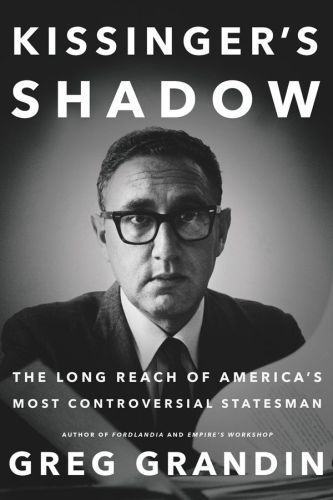
Kissinger's Shadow
The Long Reach of America's Most Controversial Statesman
کتاب های مرتبط
- اطلاعات
- نقد و بررسی
- دیدگاه کاربران
نقد و بررسی

Starred review from June 8, 2015
Assessing Henry Kissinger’s impact on American foreign policy, Grandin (The Empire of Necessity) returns to the source of the man’s political thought: his Harvard undergraduate thesis, “The Meaning of History.” Within Kissinger’s earliest writing Grandin finds the basis for his “imperial existentialism,” a Spenglerian realpolitik that endorses action in order to resist decline and assert a nation’s purpose. Beholden to no moral or ethical code and armed with a tragic sense of human history, Kissinger left academia to formulate a doctrine that prioritized instinct and will over empirical data and causality. Though his tactics proved ill-suited to winning either wars or allies, they did prove effective in winning elections, cementing Kissinger’s position within the national security state. Grandin is unsparing in his criticism of Kissinger and his theories, but his aims go beyond polemic and towards resolving the contradiction of Kissinger’s two legacies: one as the man who opened China, improved relations with the Soviets, and ended the 1973 Arab-Israeli War through shrewd shuttle diplomacy; the other as the architect of the illegal bombing campaigns in Cambodia, the invasion of Laos, and a series of destabilizing coups and assassinations. Reaganites criticized Kissinger, yet benefited from the national security state he formed. Grandin pinpoints that legitimization of interventionism as Kissinger’s true bipartisan contribution to American politics. Ever the marvelous thinker, Grandin will have even the most ardent Kissinger foe enthralled.

June 1, 2015
A focused examination of Henry Kissinger's foreign policy as the normalization of "secrecy and spectacle," from Southeast Asia to Chile to Iran to Iraq. Grandin (History/New York Univ.; The Empire of Necessity: Slavery, Freedom and Deception in the New World, 2014, etc.) takes on what he considers the pernicious foreign policy legacy of Kissinger and his validation of the idea of perpetual need to "fight little wars in grey areas with resolve." Unlike the "righteous indignation" of Christopher Hitchens' The Trial of Henry Kissinger (2001) or Seymour Hersh's incomplete The Price of Power (1983), Grandin takes in the full sweep of American foreign policy under Kissinger's "shadow" through the present-day quagmires in Iraq and Afghanistan, which have featured the same imperial arrogance that drove Kissinger's highly secret Vietnam-Laos-Cambodia policy under President Richard Nixon. The hallmarks of Kissinger's style, as formulated as early as his 1954 Harvard doctoral thesis, were ethical relativism, a championing of man's freedom over cause and effect and a rejection of the Cold War policy of containment. Kissinger's "alarmism" proved "a good career move," as Grandin demonstrates in his chronicle of Kissinger's early advising of Nelson Rockefeller and his leaking of information on the September 1968 Paris peace talks between Washington and Hanoi to the Nixon campaign camp (to keep Democratic rival Hubert Humphrey from gaining the upper hand), which allowed Kissinger into the inner circle of Nixon, who "anointed" him national security adviser. Creating Operation Menu, the ultrasecret bombing campaign of Cambodia (a sovereign, neutral country), followed by a ground invasion, created a siege mentality within government in the face of civil opposition and ferocious adherence to action at all cost. Grandin knowledgeably depicts how "Nixon's tool" similarly polarized governments in Pakistan, Angola, Iran, Chile, and elsewhere. A trenchant and succinct depiction of the ongoing artful dodging of the nonagenarian statesman.
COPYRIGHT(2015) Kirkus Reviews, ALL RIGHTS RESERVED.

September 1, 2015
No foreign policy official has had more influence than Henry Kissinger (b. 1923), claims Grandin (history, New York Univ.; The Empire of Necessity) in this indictment of both Kissinger's diplomacy as national security advisor to Richard Nixon and later secretary of state to both Nixon and Gerald Ford as well as his advocacy of George W. Bush's regime-change politics during the Iraq War. The author's bleak assessment, which relies heavily on primary resources including newly declassified records, describes "Kissingerism" as a doctrine based on the imperial presidency and American exceptionalism stating that gut feelings are more important than historical facts, and what is good for Kissinger is good for the world. Kissinger's heavy and hidden-handed abuses are shown in Southeast Asia, the Middle East, Southern Africa, and Latin America. "Kissingerism," concludes Grandin, has become ingrained in U.S. foreign policy and is practiced by both parties. VERDICT Grandin will win no friends among Kissinger supporters, yet this book will find its audience among political scientists, historians, and informed readers attempting to assess the statesman's complex legacy. Alistair Horne's Kissinger and Jeremi Suri's Henry Kissinger and the American Century offer more favorable views of Kissinger, the diplomat.--Karl Helicher, Upper Merion Twp. Lib., King of Prussia, PA
Copyright 2015 Library Journal, LLC Used with permission.

July 1, 2015
Author of the the Bancroft Awardwinning The Empire of Necessity (2014), Grandin here demonstrates the further breadth of his historical curiosity. Consisting in some measure of complex political philosophy (Henry Kissinger in the tradition of Oswald Spengler), and to some degree psychology (as all studies of Kissinger and Nixon seem to emphasize), the book, though often difficult, not least of all because of Kissinger's own peculiar logic ( Inaction needs to be avoided to show that action is possible ), will be of lasting interest to those fascinated by the Nixon years. In the angle of his criticism of Kissinger, Grandin claims to be somewhat antithetical to Christopher Hitchens' demonization of the statesman in The Trial of Henry Kissinger (2001), but it is a subtle difference. Kissinger is portrayed as not just a foil, but an enabler of the new right. His role, for example, in derailing the Vietnam peace talks in 1968 or in the bombing of neutral Cambodia and Laos (the facts of which are chillingly retold), and his acceptance (advocacy?) of the possibility of endless war, is indeed demonic, and Grandin's argument is compelling. This book should receive major attention.(Reprinted with permission of Booklist, copyright 2015, American Library Association.)

























دیدگاه کاربران